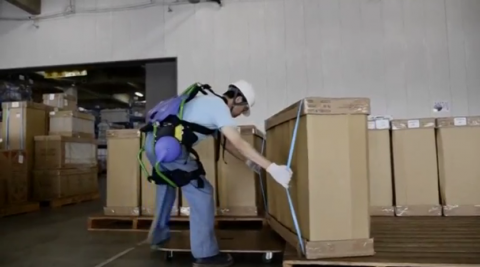
TOKYO, Japan (Reuters) — A distribution and storage management company in Japan, where the population is ageing faster than any other country in the world, has introduced a robotic harness called a Power Assist Suit to support their older employees.
Over half of the nearly 100 employees working at Ueda Group’s distribution center in the country’s biggest industrial region, Kawasaki, are in their 40s and 50s, the company said, and their jobs require them to push and lift large, heavy boxes.
The Suit looks similar to a harness, and is designed to specifically support the lower back by keeping it aligned and taking a lot of the weight.
Once the user switches it on, it automatically changes modes along with their movements, whether picking up, holding, carrying, or putting down, in order to provide the best protection.
Employee Hiroaki Okutani, 57, was the first to try the Power Assist Suit, and said it had come as a welcome relief after he suffered from a slipped disc last year.
“Wearing this, I can continue to work without worrying much about it,” Okutani said, and proceeded to lift boxes weighing up to 80 kg (176 pounds). “Although I don’t know what age I’ll be capable of working to, I’d like to continue to work here as long as my physical strength allows me to.”
Priced at one million yen ($8,983) each, over 200 devices including prototypes have been sold since the suit’s maker ATOUN Inc, which started under Panasonic Co.’s venture program, started developing them in 2015 — all to companies in the construction, logistics, and agriculture sector.
Yuichi Hayashi, the head of logistics at Ueda Group, said the suit helps the company support their older employees and secure their workforce, as although it is better to employ younger people because of the physical requirements of the job, Japan’s ageing and tightening labor market has made this difficult.
The number of people aged 65 or older accounted for 26.7 percent of Japan’s population in 2015, dwarfing the global average of about 8.5 percent.







